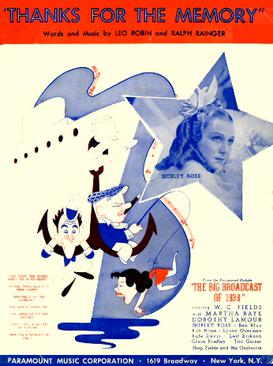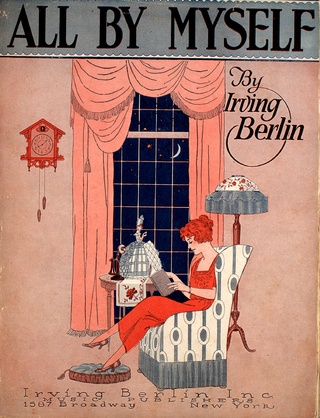
"One for My Baby (and One More for the Road)" is a song written by Harold Arlen and Johnny Mercer for the movie musical The Sky's the Limit (1943) and first performed in the film by Fred Astaire.
"Angel Eyes" is a 1946 popular song composed by Matt Dennis, with lyrics by Earl K. Brent. It was introduced in the 1953 film Jennifer. In the film, Matt Dennis sings the song and accompanies himself on piano, while Ida Lupino and Howard Duff among others are dancing to it.

The Complete Ella Fitzgerald Song Books were a series of eight studio albums released in irregular intervals between 1956 and 1964, recorded by the American jazz singer Ella Fitzgerald, supported by a variety of orchestras, big bands, and small jazz combos.

Ella Fitzgerald Sings the Irving Berlin Song Book is a 1958 studio album by the American jazz singer Ella Fitzgerald, with a studio orchestra conducted and arranged by Paul Weston, focusing on the songs of Irving Berlin. It was part of the popular and influential Songbook series.

"Thanks for the Memory" (1938) is a popular song composed by Ralph Rainger with lyrics by Leo Robin. It was introduced in the 1938 film The Big Broadcast of 1938 by Bob Hope and Shirley Ross, and recorded by Shep Fields and His Orchestra featuring John Serry Sr. on accordion in the film and vocals by Bob Goday on Bluebird Records. Dorothy Lamour's solo recording of the song was also popular, and has led to many mistakenly believing over the years that it was she who sang the tune with Hope in the film.
"Heat Wave" is a popular song written by Irving Berlin for the 1933 musical As Thousands Cheer, and introduced in the show by Ethel Waters.

"Somebody Loves Me" is a popular song, with music written by George Gershwin, and lyrics by Ballard MacDonald and Buddy DeSylva. The song was published in 1924 and featured in George White's Scandals of 1924.

"The Nearness of You" is a popular song written in 1937 by Hoagy Carmichael with lyrics by Ned Washington. Intended for an unproduced Paramount film titled Romance In The Rough, the studio's publishing division Famous Music reregistered and published the song in 1940. It was first recorded by Chick Bullock and his Orchestra on Vocalion. Despite numerous accounts to the contrary, the song was never scheduled for and does not appear in the 1938 Paramount film Romance in the Dark.
"Let's Call the Whole Thing Off" is a song written by George Gershwin and Ira Gershwin for the 1937 film Shall We Dance, where it was introduced by Fred Astaire and Ginger Rogers as part of a celebrated dance duet on roller skates. The sheet music has the tempo marking of "Brightly". The song was ranked No. 34 on AFI's 100 Years...100 Songs.
"Let's Have Another Cup of Coffee" is a song by Irving Berlin appearing in the musical comedy Face the Music, which opened in 1932. On opening night it was sung by J. Harold Murray and Katherine Carrington. The song, set in a self-service restaurant modeled on the Horn & Hardart Automat, is sung in the play by a group of once-wealthy citizens who were awaiting better times, as mirrored in the song's opening lyrics:
"Let's Face the Music and Dance" is a song published in 1936 by Irving Berlin for the film Follow the Fleet, where it was introduced by Fred Astaire and featured in a celebrated dance duet with Astaire and Ginger Rogers. The jazz song has also been covered by various artists years following its release, including Nat King Cole, Ella Fitzgerald, Frank Sinatra, Mel Torme, Todd Gordon and others.
"How Deep Is the Ocean?" is a popular song written by Irving Berlin in 1932. The song was developed from an earlier Berlin song "To My Mammy" which was sung by Al Jolson in his film Mammy (1930). In the earlier song, the lyrics include the questions "How deep is the ocean? / How high is the sky?" and this was the genesis of "How Deep Is the Ocean?".
"Top Hat, White Tie and Tails" is a popular song written by Irving Berlin for the 1935 film Top Hat, where it was introduced by Fred Astaire.
"I'm Putting All My Eggs in One Basket" is a popular song written by Irving Berlin for the 1936 film Follow the Fleet, where it was introduced by Fred Astaire and Ginger Rogers. Astaire had a huge hit with the song in 1936 and other popular versions that year were by Jan Garber and by Guy Lombardo.
"Now It Can Be Told" is a popular song written by Irving Berlin for the 1938 film Alexander's Ragtime Band, where it was introduced by Alice Faye and Don Ameche. It was nominated for an Academy Award in 1938 but lost out to "Thanks for the Memory".
"You Keep Coming Back Like a Song" is a popular song written by Irving Berlin for the 1946 film Blue Skies, where it was introduced by Bing Crosby. The song was nominated for "Best Song" in 1946 but lost out to "On the Atchison, Topeka and the Santa Fe". Dinah Shore's version was biggest in the US reaching the No. 5 spot, while Crosby's version peaked at No. 12. Jo Stafford also had chart success with it and her version achieved the No.11 position.
"Reaching for the Moon" is a popular song written by Irving Berlin for the 1930 musical film of the same name.
"I Let a Song Go Out of My Heart" is a 1938 composition by Duke Ellington, with lyrics added by Irving Mills, Henry Nemo and John Redmond. The song became a number one hit for Ellington in 1938. Other hit versions the same year were by Benny Goodman, Connee Boswell, Hot Lips Page, and Mildred Bailey. It was performed as part of The Cotton Club Parade of 1938.

"All by Myself" is a popular song written by Irving Berlin, published in 1921.
"I Never Had A Chance" is a popular song written by Irving Berlin, published in 1934. Popular versions that year were by Eddy Duchin and by Glen Gray & The Casa Loma Orchestra.








